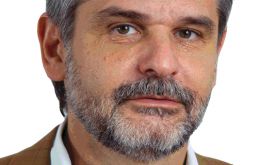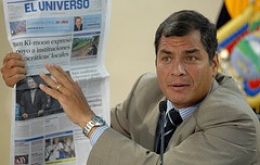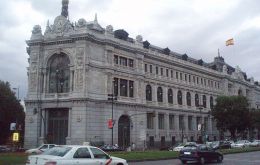MercoPress. South Atlantic News Agency
Stories for October 2012
-
Thursday, October 25th 2012 - 00:10 UTC
Fed pledges all efforts and policy tools to combat “elevated” unemployment

In its last meeting before the November 6 presidential election, the Federal Reserve confirmed its current fresh-money support program for the recovery of the US economy arguing that growth continues slowly and unemployment rate “remains elevated”.
-
Thursday, October 25th 2012 - 00:04 UTC
Argentine lawmakers press Falklands’ issue on UK peers at Parliamentary Union

Argentine lawmakers met with their UK peers and called for an end to unilateral hydrocarbons explorations in Falkland Islands waters and for an end to military exercises in the South Atlantic.
-
Wednesday, October 24th 2012 - 21:25 UTC
India becoming leading exporter of bovine meat: 1.66 million tons in 2012

Indian buffalo meat exports have grown to record levels in the last two years, making India the fourth country in the world to export more than 1 million tons of bovine meat annually.
-
Wednesday, October 24th 2012 - 21:17 UTC
Panama and Uruguay with greatest per capita GDP increase in 2008/2012, says Latinvex

Panama was the country with the greatest increase in per capita GDP in the last five years, followed by Uruguay, Peru, Dominican Republic and Chile according to a report from the digital publication Latinvex.
-
Wednesday, October 24th 2012 - 21:12 UTC
“Ecuador in the midst of a press freedom crisis”, claims IPI in-situ report

The International Press Institute (IPI) released a final report on its May 2012 press freedom mission to Ecuador, stating that the nation’s private media outlets are being targeted by the government of President Rafael Correa.
-
Wednesday, October 24th 2012 - 21:04 UTC
First time in US presidential race history that no candidates are WASP

Argentine political analyst and historian Rosendo Fraga writes about the US presidential elections and their global impact, plus underlining some interesting facts about the country’s population and religion trends and their impacts.
-
Wednesday, October 24th 2012 - 05:51 UTC
Cristina Fernandez triggers further uncertainty and fears to markets and investors

The Argentine stock market Merval index fell the most in eleven months following on President Cristina Fernandez plans to overhaul securities rules and force insurers to spend more on industrial and infrastructure projects.
-
Wednesday, October 24th 2012 - 05:47 UTC
Brazil’s industrial production slows in September says Industries lobby

Brazil's industrial production slowed in September from August amid tight competition and a lack of demand, according to a survey released Tuesday by the country's National Confederation of Industries, or CNI.
-
Wednesday, October 24th 2012 - 05:44 UTC
Brazil a magnet for auto manufacturers: Land Rover and KIA with plant plans

Jaguar Land Rover will likely decide before the end of this year whether to build a factory in Brazil, local President Flavio Padovan said on Tuesday. South Korea’s KIA Company is also considering the manufacturing plant option following the increase in import taxes.
-
Wednesday, October 24th 2012 - 05:41 UTC
Spanish economy continues to contract with no short term expectations of change

Spain’s economy contracted 0.4% in the third quarter and continues to face strong headwinds, the central bank said on Tuesday. Adverse financial conditions eased “somewhat” and the decline in domestic demand was 1.2%, an improvement over the 1.4% fall in the second quarter.
